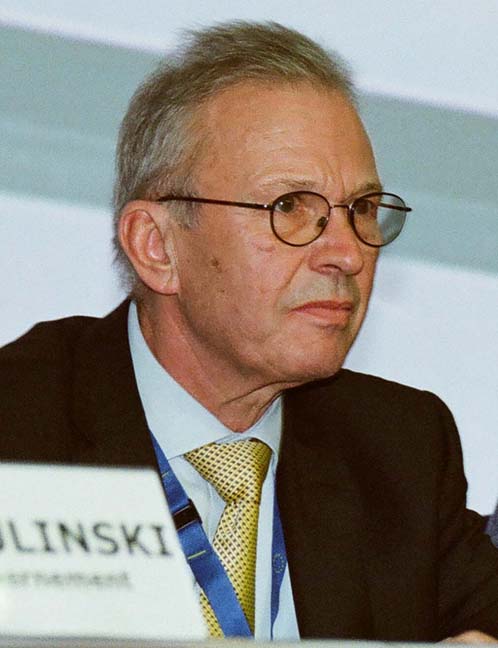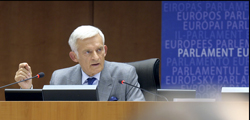Washington, D.C., has a peculiarity of seasons. While most of the world marks the shifts between winter and spring, summer and autumn, the politicos on the streets of the U.S. capital count the passage of time in two-year increments.
New operatives and appointees flock to the centers of power in the early days of each administration and the opening of each Congress, then migrate to friendlier climes as congressional elections loom and the administration winds down — as it is now.
Washington, D.C., has a peculiarity of seasons. While most of the world marks the shifts between winter and spring, summer and autumn, the politicos on the streets of the U.S. capital count the passage of time in two-year increments.
New operatives and appointees flock to the centers of power in the early days of each administration and the opening of each Congress, then migrate to friendlier climes as congressional elections loom and the administration winds down — as it is now.
The GPS community, in particular, seems to be caught up in this season’s migration. New personnel are stepping into key leadership posts in the departments of defense and transportation as well as other agencies that work together to guide the GPS program.
The National Coordination Office (NCO) for Space-Based Positioning, Navigation, and Timing (PNT), which supports all of these efforts, has been operating for months without a top executive. Changes are occurring in the congressional committees that authorize the GPS budget and perhaps in those that can influence the fortunes of the constellation’s operations and utility.
These personnel shifts are occurring just as a new effort to rewrite the nation’s telecommunications laws is emerging, potentially threatening GPS frequencies and applications.
The most notable shifts are within the Department of Defense (DoD). General William Shelton, who became Commander of Air Force Space Command (AFSPC) in January 2011, will retire September 1. By all accounts his leadership of those responsible for the modernization and support of the GPS system has been admirable. Although no job at this level is ever easy, his tenure has weathered one squall after another with years of unusually serious budgetary challenges, glitches in efforts to enhance the system, and the rise of new threats to, and doubts about, the availability of GPS signals.
When he assumed the helm in 2011, Shelton stepped immediately into the middle of what would become the biggest threat so far to GPS frequencies. That same month a Virginia firm called LightSquared, amid great controversy, won conditional permission from the Federal Communications Commission (FCC) to build a coast-to-coast, high-powered terrestrial broadband network using frequencies neighboring those used by GPS. The firm’s project fit neatly into the Obama administration’s plan to provide more spectrum for broadband companies and encourage competition within the wireless communications industry.
RF power from LightSquared’s transmitters and mobile devices, however, threatened to overwhelm GPS receivers across the country. Shelton took a stand against LightSquared’s aspirations and made national news for refusing to submit to pressure from the White House to soften congressional testimony about the clear interference problems that testing had shown. Although the issue is not fully resolved, the Light-Squared project is currently sidelined.
Patent, Jamming, and Budget Problems
Other challenges followed, including an effort by the British Ministry of Defense to patent one of the modernized GPS signal structures — a patent that was withdrawn after what experts described as government-to-government discussions. Other concerns arose about the aging GPS constellation, repeated demonstrations that the GPS signal could be spoofed and jammed, and surging threats from hackers.
Shelton also found himself caught up in budget battles consuming Washington as well as significant problems with the navigation payload on the new GPS III satellites and the new ground system. To tackle both the technical and financial problems, his team weighed a variety of alternatives including reconfiguring the GPS constellation to take advantage of very small satellites and investing in the ability to launch more than one satellite at a time. Among the outcomes of that work is the recent restructuring of the ground system contract and the release in June of a request that could lead to a new prime contractor for the last 22 GPS III spacecraft.
Shelton seized some opportunities as well. He is credited with turning on the navigation message in the L2C and L5 signals, a move expected to spur receiver development and innovation as the commercial sector gains experience with the new signals.
New AF Space Commander
Shelton will be replaced by Lt. Gen. John Hyten, who has served as his AFSPC vice-commander for the last two years. Hyten has a Harvard engineering degree and a masters in business administration and has served in Washington as director for space programs in the Office of the Assistant Secretary of the Air Force for Acquisition — experience that should serve him well has as sequestration reemerges and squeezes the GPS budget tighter still.
Hyten’s experience as the director of space forces during Operations Enduring Freedom and Iraqi Freedom, and in senior engineering positions on anti-satellite weapon system programs, also could prove very valuable as the challenges from adversaries mount. He also has worked with the GPS program before, noted one source, and has direct experience with the interagency process that guides GPS policy.
“He’s definitely one of the GPS people,” said the well-informed source, who asked not to be identified due to a lack of authorization to speak publicly. “We’re glad to have him over in Space Command.”
In yet another change for Space Command, Lt. Gen. Ellen Pawlikowski, the head of the Space and Missile Systems Center at Los Angeles Air Force Base, has left to become military deputy within the Office of the Assistant Secretary of the Air Force for Acquisition — replacing Lt. Gen. Charles Davis as the service’s top military acquisition official. SMC, which is part of Space Command, is home to the Global Positioning Systems Directorate.
Taking over at SMC is Lt. Gen. Samuel Greaves, who was serving as deputy director in the Missile Defense Agency’s Office of the Undersecretary of Defense for Acquisition, Technology and Logistics.
Other PNT Leadership Changes
The handoffs within Space Command are not the only changes in the GPS management team at the Department of Defense.
Robert Work has replaced Ashton Carter as the deputy secretary of defense and takes his place as co-chair of the National Executive Committee for Space-Based Positioning, Navigation, and Timing (PNT ExCom). Work, who served 27 years in the U.S. Marines, was undersecretary of the Navy from 2009 to 2013. He has a master of science degree in space system operations and served on the DoD transition team for the in-coming Obama administration. He was confirmed as deputy secretary in April.
His co-chair on the PNT ExCom is also relatively new to the job. Victor Mendez is acting deputy secretary of transportation. He stepped into the roll in late December 2013 to replace the departing John Porcari. Mendez, who has an MBA and a degree in civil engineering, was sworn in as the federal highway administrator in July 2009. He also served on the White House transition team.
The PNT ExCom is supported by the Executive Steering Group, which meets more often than the ExCom, and deals with interagency matters that can be handled without elevating them to the deputy secretary level. The Steering Group has representatives from the same departments as the ExCom plus agencies within those departments such as the Air Force and the Federation Aviation Administration.
The Pentagon’s chief information officer (CIO) and the Department of Transportation (DoT) assistant secretary for research and technology co-chair the Steering Group. Greg Winfree has held the latter position for a while, but the DoD CIO, whose office is the nexus for DoD decisions on GPS policy and procurement, is new. Teri Takai left that job at the beginning of May with only a week’s notice to the surprise of many in the GPS community
“I think she did a lot to establish the influence of the CIO office,” said Scott Burgett, director of automotive OEM platform engineering for GPS user equipment manufacturer Garmin International, who praised her as “a very effective advocate for GPS.”
Takai has been replaced, for now, by Terry Halvorsen, who is the Pentagon’s acting CIO. His role, however, may not be permanent. According to Defense Daily, the DoD has issued a formal statement from spokeswoman Lt. Col. Valerie Henderson stating, “Mr. Halvorsen will lead the DoD CIO organization until a permanent DoD CIO is selected by [Defense] Secretary [Chuck] Hagel.”
Halvorsen’s situation underscores the challenges facing anyone in a job in an acting capacity. When so much depends on the skills, expertise, perspectives, and advocacy of individuals, having people who may not be staying — or are perceived as temporary — makes planning and progress much harder.
ExCom Newbies
The departments of state, commerce and homeland security all have representatives to both the ExCom and the steering group who are either new to their jobs or still in an acting capacity.
Bruce Andrews was just named acting deputy secretary of commerce in June. His experience in telecommunications could be especially useful as the battle over spectrum heats up. He was general counsel for the Senate Committee on Commerce, Science, and Transportation, the committee that oversees the FCC. Prior to that he was a telecommunications attorney and managed government affairs for Ford Motor Company.
Commerce is represented in the PNT Executive Steering Group by former astronaut Kathryn Sullivan, who was finally confirmed in March as the under secretary of commerce for oceans and atmosphere and as National Oceanic and Atmospheric Administration (NOAA) administrator. She is an oceanographer who, when she served as NOAA’s chief scientist, oversaw a research and technology portfolio that included fisheries biology, climate change, satellite instrumentation, and marine biodiversity.
The GPS commercial sector may particularly appreciate the background of Judith Garber, the State Department’s ExCom representative and the acting assistant secretary of state for the Bureau of Oceans and International Environmental and Scientific Affairs (OES). She is a career foreign service officer who has held economic and business development posts around the world and was named to her new post at the end of April.
The State Department’s person in the steering group is Jonathan Margolis, acting deputy assistant secretary at OES for the science, space, and health. He has a Ph.D. in psychology from Harvard University, focusing on negotiation and conflict resolution, and a master’s degree from the Fletcher School of International Law and Diplomacy as well as hands-on experience organizing international communications. Given that the current round of international negotiations over spectrum is coming to a head next year, his skills could be very valuable.
Just joining the PNT ExCom is Deputy Secretary of Homeland Security (DHS) Alejandro Mayorkas. A former U.S. attorney, he had been serving as the director of DHS’s United States Citizenship and Immigration Services (USCIS), which operates the largest immigration system in the world. He was sworn in last December.
Confirmed in March, as under secretary for DHS’s National Protection and Programs Directorate, Suzanne Spaulding brings a wide range of experience in intelligence and cybersecurity matters. She served at the Central Intelligence Agency for six years and on the staff of both the House and Senate intelligence committees.
Spaulding’s role at DHS gives her the responsibility for protecting critical infrastructure. GPS already is considered an essential element in most of the nation’s critical infrastructure sectors, and some top experts have argued GPS should itself be designated critical infrastructure.
New Leadership at NCO
The leadership at the National Coordination Office, the permanent staff for PNT ExCom, is also in flux. Former NCO director Jan Brecht-Clark retired in December after serving just a year. The NCO’s deputy director, Col. Harold “Stormy” Martin, retired from military service several months later.
Now that Martin has left the military he could potentially return as the NCO’s director — the path taken by Anthony Russo, who was NCO director from January 2010 through December 2012. The DoT selects the NCO director and is expected to name its choice in early July, although nothing had been announced as of press time.
Meanwhile, on Capitol Hill
Key personnel changes are also under way in Congress with some members retiring, some moving to different roles because of term limits, and others forced out by election losses.
Among those retiring will be the chairmen of the both the House and Senate armed services committees, which oversee the GPS program. Overall, these committees and their chairmen have been very supportive of GPS, particularly in their budget authorizations.
House Armed Services Chairman Howard “Buck” McKeon, R-California, who is retiring from Congress, told reporters that term limits, which mandate his giving up his chairmanship, were the “biggest motivator” for his decision. Rep. Mac Thornberry of Texas, who is described in news reports as being extremely knowledgeable on defense matters and who has already made his interest in the chairmanship clear, is the most likely replacement.
Sen. Carl Levin, D-Michigan, chair of the Senate Armed Services Committee, is also retiring. He has endorsed Sen. Jack Reed, D-Rhode Island, as his successor, according to the web site Daily Kos, but Reed is also in line to take the soon-to-be-vacant chairmanship of the Senate Banking, Housing and Urban Affairs Committee. Senators Bob Nelson, D-Florida and Claire McCaskill, D-Missouri, would be next in line by seniority although Nelson has a number of other options.
The leadership situation in two other Senate committees is particularly worth watching. Sen. John D. Rockefeller, D-West Virginia, who now heads the Commerce and Transportation Committee, is retiring after five terms. Mark Pryor, D-Arkansas, the chairman of the Communications, Technology and Internet Subcommittee, is in a very close race this fall. These two committees have the lead on spectrum issues in the Senate and played a role in the LightSquared debate a few years ago.
The chairmanships are particularly important in this case because the heads of the corresponding House committees have launched an effort to update the Communications Act of 1934 and have placed issues that could greatly impact GPS squarely on the table.
House Energy and Commerce Committee Chairman Fred Upton, R-Michigan, and Communications and Technology Subcommittee Chairman Greg Walden, R-Oregon, announced their multi-year review in December. They have asked for feedback on issues including receiver standards and the idea of altering the role the National Telecommunications and Information Administration (NTIA).
NTIA watches out for the federal government users of frequencies — including those who rely on GPS — and played a key role in protecting the GPS spectrum during the LightSquared controversy. As things now stand, the FCC and NTIA have to agree on frequency allocations, an arrangement deemed duplicative by some who would like the FCC to have most if not all of the decision-making power. For more on this story, see news article on page 20.
Upton and Walden appear well positioned and, given that term limits will force Upton to relinquish his chairmanship by 2017, well motivated to launch legislation next session. Whether they succeed or not depends in part on who chairs the Senate committees. Sen. Barbara Boxer, D-California, is next in line for the chairmanship, but she already leads other committees and the Democrats have not imposed term limits on their members. Democrats Bill Nelson of Florida and Maria Cantwell of Washington state would seem to be likely choices based on seniority.
In any case, it’s too soon to know, particularly since most political experts give the Republicans better than even odds of taking control of the Senate in this fall’s elections. If that happens, then Republicans will control the chairmanships and set the agenda. If they can come to agreement amongst themselves, they will be in a much stronger position to push changes through.
Unfortunately, the GPS community already has lost some of the members who acted to protect GPS frequencies during the LightSquared fracas.
Of the six members that organized “Dear Colleague” letters opposing LightSquared‘s request in the spring of 2011, half are gone or on their way out. Sen. Ben Nelson, D-Nebraska, and Rep. Steve Austria, R-Ohio, both declined to seek re-election in 2012. Rep. Ralph Hall, R-Texas, the oldest-serving member of Congress, lost his primary bid to a Tea Party challenger this spring. A fourth GPS advocate, Rep. Collin Peterson, D-Minnesota, is more likely than not to win, according to Larry Sabato, an expert on electoral politics at the University of Virginia’s Center for Politics, but he is in a competitive race.
All in all, the GPS community is facing a substantial new challenge over spectrum with a team that is largely new to GPS issues. It also has fewer proven friends on Capitol Hill to speak on its behalf. The good news is that the new contingent of GPS leaders has an array of particularly useful skills and time to plan ahead for the next fight. Whether they will be ready or not remains to be seen.






